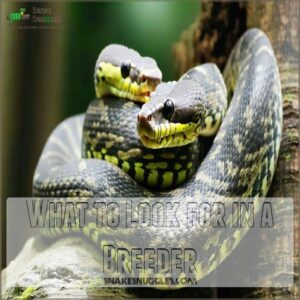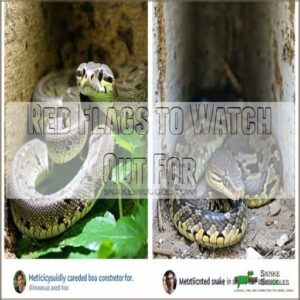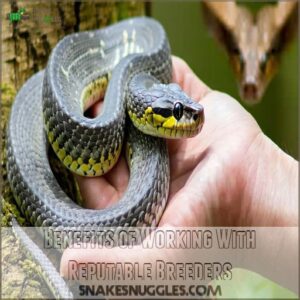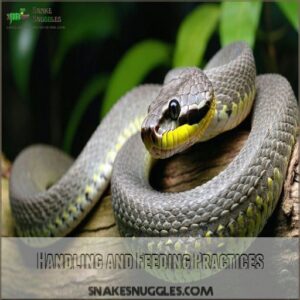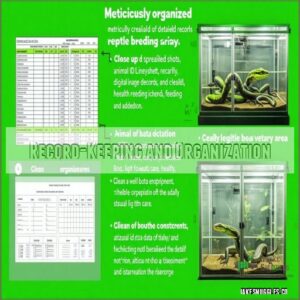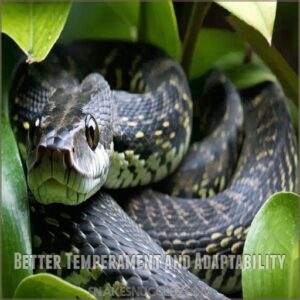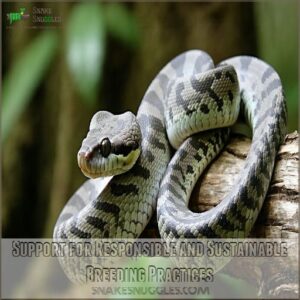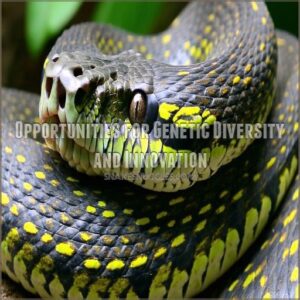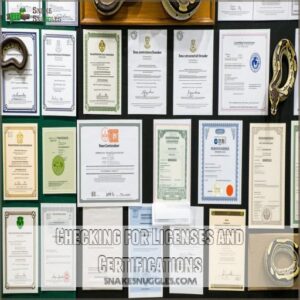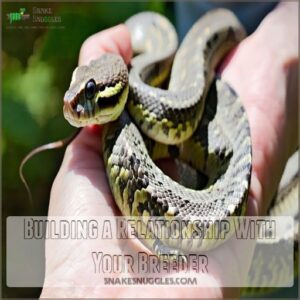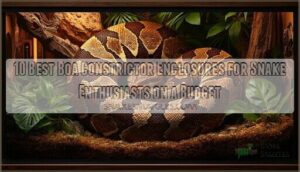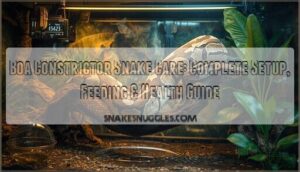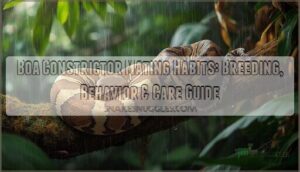This site is supported by our readers. We may earn a commission, at no cost to you, if you purchase through links.
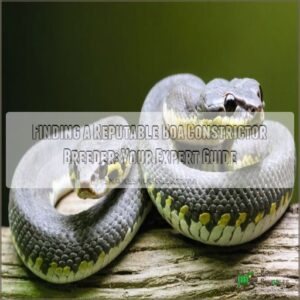
Check their facilities for cleanliness, proper enclosure conditions, and rigorous health protocols.
Watch out for red flags like vague answers, profit-driven attitudes, or unwillingness to discuss medical histories.
A quality breeder will prioritize snake welfare, provide expert advice, and offer health guarantees. They’ll have well-maintained facilities, implement strict quarantine procedures, and keep detailed records. Your future scaly friend’s health depends on choosing wisely – and trust me, the right breeder can make all the difference.
Table Of Contents
- Key Takeaways
- What to Look for in a Breeder
- Red Flags to Watch Out For
- Benefits of Working With Reputable Breeders
- How to Evaluate a Breeder’s Facilities and Operations
- Importance of Captive-Bred Snakes
- Checking for Licenses and Certifications
- Building a Relationship With Your Breeder
- Frequently Asked Questions (FAQs)
- Should I buy a boa constrictor?
- Can a boa constrictor be a pet snake?
- Are boa constrictors native to Texas?
- Where do boa constrictors live?
- How big does a boa constrictor get?
- Are boa constrictors pythons?
- What is the calmest boa constrictor?
- How much does a pet boa constrictor cost?
- What is the most docile boa constrictor?
- What is the lifespan of a boa constrictor in captivity?
- Conclusion
Key Takeaways
- Look for breeders who are transparent about their practices, provide health guarantees, and openly answer all your questions.
- Check for clean, well-maintained facilities with proper enclosures, quarantine protocols, and documented genetic records.
- Steer clear of breeders prioritizing profit over animal welfare or those unwilling to provide medical history or clear communication.
- Choosing a reputable captive-bred boa ensures better health, temperament, and supports ethical breeding practices over wildlife trafficking.
What to Look for in a Breeder
When you’re on the hunt for a boa constrictor, choosing the right breeder can make all the difference.
in your snake’s health and your future reptile adventures.
Look for a breeder who’s transparent about their practices, passionate about their animals, and ready to provide you with a wealth of knowledge.
That’ll set you up for success in the exciting world of boa ownership.
Transparency and Honesty
In boa constrictor breeding, transparency isn’t just a buzzword—it’s your golden ticket to a healthy, happy snake.
A reputable breeder opens up like a book, sharing insights that’ll make your reptile journey smooth sailing.
Here’s what to look for:
- Crystal-clear communication about the snake’s lineage
- Willingness to answer every single question
- Detailed breeding history at your fingertips
- Honest discussions about potential genetic traits
- No-nonsense approach to pricing and expectations
Health and Hygiene Standards
A reputable boa breeder won’t cut corners on health and hygiene.
Look for clean enclosures, proper ventilation, and tools sanitized with veterinary-grade disinfectants.
Quarantine protocols are a must to prevent disease spread, along with parasite prevention practices.
Ethical breeders monitor boa constrictor health through regular checks, ensuring their husbandry practices foster disease detection early and keep every snake thriving.
Maintaining proper humidity levels, such as proper humidity control, is also necessary for boa constrictor health to flourish.
Experience With Boa Constrictors
An ethical boa breeder knows their stuff.
Look for someone with hands-on experience handling various morph varieties and tackling health concerns.
They should freely share boa care tips and breeding insights, making you feel confident in their expertise, especially regarding genetic diversity practices.
A responsible reptile breeder who’s been around the block makes sure your future snake thrives, not just survives—worth every penny!
Red Flags to Watch Out For
Picking a breeder isn’t just about finding cool-looking snakes—it’s about avoiding serious red flags that could spell trouble.
If a breeder seems shady, dodges questions, or cuts corners on care, it’s time to walk away.
Lack of Transparency and Communication
A responsible reptile breeder is upfront about their practices and snake care.
If a boa constrictor breeder avoids questions or provides vague answers, that’s a red flag. Misleading morph descriptions or hidden health issues can signal false advertising claims.
Unresponsive sales or unclear policies dent trust. Reputable breeders value communication—it builds their reputation and guarantees you find a boa breeder you can rely on.
Unwillingness to Provide Health Guarantees
A responsible boa constrictor breeder won’t shy away from health guarantees. If a breeder avoids accountability for hidden health issues or vet visit transparency, that’s a problem.
Watch for red flags like:
- No refund policies for sick snakes.
- Refusal to discuss medical expense support.
- Vague answers on reptile breeding practices.
- Avoidance of health records or guarantees.
Overemphasis on Profit Over Animal Welfare
Watch out for breeders focused only on making money. Signs include unfair pricing schemes, overbreeding consequences like unhealthy babies, and neglectful husbandry practices. Inhumane treatment and lack of proper reptile care resources are major red flags.
Researching products from established breeders, such as those offering snake care supplies, can help you identify a responsible operation.
A responsible boa breeding operation prioritizes animal welfare over profit. Buy boas ethically—support breeders who value their snakes’ health and long-term wellbeing.
Unknowledgeable or Unresponsive Staff
Spot unknowledgeable or unresponsive staff by watching for these signs:
- Staff can’t explain basic boa care or breeding methods.
- They dodge questions about response time guarantees or office hours availability.
- High staff turnover rates suggest poor training or management.
- They lack basic customer service, like prompt replies.
A responsible breeder should be knowledgeable about the specific needs of different subspecies, such as the BCI growth rate.
Responsible boa constrictor breeders prioritize knowledgeable, accessible teams you can rely on.
Benefits of Working With Reputable Breeders
Working with a reputable breeder gives you access to healthy snakes that are well-cared for and properly socialized.
Plus, you’ll gain expert advice on boa care and genetics, making your journey as a boa owner smoother and more rewarding.
Access to Healthy and Well-Cared-for Snakes
Choosing reputable boa constrictor breeders means you’re getting healthy boa constrictors raised with care.
These breeders focus on clean enclosure design, proper snake handling, and stress-free snake transport, ensuring prime snake nutrition concerns are addressed.
They perform boa health testing, keeping snakes in great shape. This commitment to boa constrictor care gives you peace of mind and a strong start as an owner, ensuring they are always in great shape.
Opportunities to Learn About Boa Care and Genetics
Reputable breeders offer more than boas—they’re living boa constrictor care guides. You’ll gain insights into fascinating reptile husbandry and boa morph development without the guesswork.
Here’s how they help:
- Explain Genetics 101 to boost your breeding program skills.
- Share tips on constrictor nutrition for healthy growth.
- Expose the secrets behind rare boa morphs.
- Provide resources on reptile genetics mastery.
When selecting a snake, it’s key to choose a species that fits your needs, such as opting for beginner snakes.
Support and Community for New Owners
Connecting with a reputable reptile breeder means more than getting a healthy boa—it’s your gateway to a supportive reptile enthusiast community.
From Online Owner Forums and Snake Care Groups to Herpetological Societies and local breeder meetups, you’ll gain access to mentors and lifelong connections.
Having a New Owner Mentorship and a solid boa constrictor care guide keeps you confident and informed. Additionally, many reputable breeders participate in online Reptile Breeder Forums to share their expertise and provide valuable resources for new owners.
How to Evaluate a Breeder’s Facilities and Operations
When checking out a breeder, pay attention to how their facilities are set up and maintained.
A clean, organized space with quality enclosures and proper equipment shows they’re serious about keeping their boas happy and healthy.
Cleanliness and Organization of Facilities
When visiting reptile breeding facilities, pay attention to their sanitation routines and cleaning schedules. A reputable boa constrictor breeder maintains spotless enclosures and has a clear waste management system.
Organized facility layouts and strict biosecurity protocols prevent disease spread.
If the place looks chaotic or smells off, it’s a warning sign—they’re not prioritizing boa husbandry or health.
Quality of Enclosures and Equipment
A breeder’s enclosures should match enclosure size guidelines and feature proper heating, lighting, and humidity control systems for boas.
Look for a clean setup with a secure temperature gradient setup to keep snakes healthy and prevent escapes.
Sloppy setups can lead to stress or health issues.
Use reputable reptile breeding resources to find breeders who prioritize proper boa constrictor husbandry and care.
Handling and Feeding Practices
Good boa constrictor breeders near you should master handling and feeding practices.
Look for:
- Calm handling techniques ensuring safety.
- Clear prey size guidance matched to growth stages.
- Proper snake feeding frequency – no overfeeding here!
- Trustworthy advice on enclosure setup tips.
- Attention to feeding frenzy stages, avoiding stress.
Good breeders also prioritize reptile health guarantees, which is essential for a healthy boa constrictor.
Great reptile husbandry guarantees healthy, thriving boa constrictor morphs.
Quarantine and Biosecurity Protocols
Serious reptile breeders religiously implement rock-solid quarantine and biosecurity measures to prevent disease, particularly those that can lead to respiratory conditions.
Their protocols act like a fortress, isolating new or potentially sick boa constrictors from healthy populations.
By carefully monitoring health, using separate cleaning tools, and maintaining strict isolation, ethical boa constrictor breeders protect their entire collection’s wellbeing.
Record-Keeping and Organization
Because record-keeping separates professional reptile breeders from amateur hobbyists, you’ll want to dig deep into their organizational systems.
A top-tier boa constrictor breeder maintains thorough documentation that tells the snake’s entire life story:
- Detailed breeding inventory with unique Animal ID tracking
- Extensive veterinary logs documenting health history
- Precise feeding schedules and growth records
- Genetic lineage and morph documentation
Importance of Captive-Bred Snakes
When you’re searching for a boa constrictor, choosing a captive-bred snake isn’t just a preference—it’s a critical decision that’ll impact your reptile’s health, temperament, and overall quality of life.
By selecting a captive-bred boa from a reputable breeder, you’ll guarantee a healthier, more adaptable companion that’s been raised with expertise and care.
Better Temperament and Adaptability
When you’re eyeing a captive-bred boa, you’re setting yourself up for a friendlier snake companion.
These snakes have been gently handled from birth, developing a calm demeanor that makes them more adaptable to home life.
Reputable boa constrictor breeders focus on snake socialization, creating pets that are less likely to stress out and more likely to become your scaled buddy.
Improved Health and Reduced Risk of Disease
Want a snake that’s healthier than a wild-caught reptile? Captive-bred boas offer a game-changing advantage in disease prevention.
These carefully nurtured serpents come with significant health benefits that’ll make any reptile lover breathe easier.
- Reduced pathogen exposure through controlled breeding environments
- Thorough health testing before sale
- Precise veterinary care and nutrition planning
Snake enthusiasts, your health-conscious choice starts here.
Support for Responsible and Sustainable Breeding Practices
Your breeder’s commitment to sustainable practices isn’t just a badge of honor—it’s the heartbeat of responsible reptile ownership.
By supporting ethical breeding, you’re casting a vote for boa welfare and setting a gold standard in the reptile community.
| Practice | Impact | Sustainability |
|---|---|---|
| Genetic Diversity | Healthier Lineages | Reduced Inbreeding |
| Limited Breeding Cycles | Improved Snake Welfare | Ethical Reproduction |
| Careful Record-Keeping | Transparent Lineage | Responsible Management |
| Selective Pairing | Quality Genetics | Predictable Outcomes |
| Veterinary Oversight | Health Monitoring | Long-Term Population Care |
Reduced Demand for Wild-Caught Snakes
Every ethical choice in buying a captive-bred boa constrictor directly cuts the legs out from under harmful wildlife trafficking.
By supporting responsible reptile breeders, you’re not just getting a healthy pet – you’re protecting wild snake populations and their native habitats.
Additionally, investing in a captive-bred boa constrictor also means considering its annual care costs.
Conservation starts with conscious consumers who understand the ripple effects of their purchasing decisions.
Opportunities for Genetic Diversity and Innovation
By steering clear of wild-caught snakes, captive breeding opens up exciting horizons for boa constrictor genetic innovation.
Passionate breeders are like genetic architects, carefully mapping unique morphs and preserving rare lineages through selective breeding practices and access to specialized supplies, such as those found through online marketplaces for ethical boa breeding supplies.
This approach to breeding guarantees that future projects can produce increasingly stunning and healthy boa constrictor varieties through strategic genetic testing.
Checking for Licenses and Certifications
When hunting for a reputable boa constrictor breeder, you’ll want to look beyond flashy websites and verify their professional credentials.
Check for valid licenses, industry certifications, and compliance with local and national reptile breeding regulations.
to confirm you’re working with a responsible professional.
Local and National Licenses and Permits
When you’re hunting for the perfect boa constrictor, managing license requirements isn’t just paperwork—it’s your first defense in finding a legit breeder.
Check state and local laws, as each jurisdiction has unique permitting processes for reptile breeding.
Verifying legal compliance protects you from potential headaches and confirms you’re working with an ethical, professional boa constrictor breeder.
Industry Certifications and Memberships
After checking local permits,
look for breeders connected to reputable networks like the International Reptile Conservation Foundation or the Reptile and Amphibian Breeder’s Association. These memberships signal commitment to ethical breeding standards.
Top boa breeders often showcase certifications that prove their dedication to animal welfare and professional breeding practices, giving you peace of mind about your potential new scaly companion.
Compliance With Laws and Regulations
Every serious reptile enthusiast knows understanding legal landscapes matters when buying a boa constrictor. Industry certifications hint at a breeder’s professionalism, but legal compliance seals the deal.
Before you buy, check these key regulatory checkpoints:
- Verify state-specific exotic pet permitting requirements
- Confirm CITES documentation for international snake trades
Research local zoning laws regarding reptile ownership
Confirm the breeder maintains current breeding licenses
Check for required veterinary health inspection records
Adherence to Industry Standards and Best Practices
In the sphere of reptile breeding, top-tier breeders set the gold standard by rigorously following industry best practices.
They prioritize ethical sourcing, maintain precise records of genetic diversity, and implement cutting-edge husbandry techniques.
By adhering to these standards, reputable boa constrictor breeders demonstrate their commitment to disease prevention and responsible pet ownership, ensuring you get a healthy, well-cared-for snake.
Transparency About Their Credentials and Qualifications
A trustworthy boa breeder wears their qualifications like a badge of honor.
They’ll openly share their credentials through:
- Professional reptile breeding certifications
- Detailed documentation of genetic lineage
- Transparent facility tour opportunities
When you’re hunting for the perfect reptile partner, these credentials aren’t just paperwork—they’re your roadmap to finding a breeder who’s serious about their craft and committed to high-quality boa constrictor breeding practices.
Building a Relationship With Your Breeder
When selecting a boa constrictor breeder, you’re not just buying a snake – you’re building a long-term partnership with an expert.
who’ll guide you through your reptile ownership journey.
Your chosen breeder should become a trusted resource, offering ongoing advice, support, and insights.
that’ll help you provide the best possible care for your new scaly companion.
Establishing Trust and Communication
Open communication is your golden ticket when building trust with a reputable boa breeder. Ask questions that reveal their depth of knowledge, like how they handle genetic testing or manage snake health.
Look for breeders who welcome your curiosity, provide honest answers, and seem genuinely passionate about their reptiles. Their willingness to be transparent speaks volumes about their ethical sourcing practices.
Additionally, prioritize breeders who provide health guarantees, such as a 7-day health guarantee, to confirm you’re working with a responsible and trustworthy breeder.
Learning About Their Values and Practices
Digging deeper into a breeder’s practices reveals their true colors.
Ask pointed questions about their breeding goals and ethical sourcing strategies.
Great breeders won’t just sell you a snake; they’ll share their passion for animal welfare and transparency. reputable reptile breeder?
Want to spot a reputable reptile breeder? Listen closely to how they talk about their boa constrictors – their values shine through. animal welfare
Opportunities
When you click into the realm of boa constrictor breeders, unique opportunities unfold for connecting with passionate experts.
Reputable breeders offer more than just snakes—they provide genetic diversity insights, future litter previews, and community support.
You’ll gain access to ethical breeding networks, discover rare morphs, and build relationships that extend far beyond a simple transaction.
By considering the specific needs of a 7-foot adult male boa constrictor, such as the one offered free to collector, you can find a breeder that’s knowledgeable about the species’ particular requirements and characteristics.
Frequently Asked Questions (FAQs)
Should I buy a boa constrictor?
Think twice before turning your living room into a snake sanctuary!
Boa constrictors demand serious commitment—they’re not cuddly pets.
You’ll need expertise, space, and cash for a 20-30 year exotic companionship.
That’s not for the faint-hearted.
Can a boa constrictor be a pet snake?
Boa constrictors can totally be pets if you’re ready for a long-term commitment.
They’re low-maintenance but need specialized care.
specific habitat conditions, and aren’t ideal for first-time snake owners who want a casual companion.
Are boa constrictors native to Texas?
Imagine lush jungles, not Texas prairies.
Boa constrictors hail from Central and South America.
Spotting one in Texas likely means it’s a pet on the run, not a native slithering through the wild.
Where do boa constrictors live?
You’ll find boa constrictors mainly in Central and South America.
They thrive in rainforests, savannas, and arid regions.
They adapt well, whether hanging in trees, slithering through grasslands, or curling up in rocky crevices.
How big does a boa constrictor get?
These snakes can grow between 6 and 13 feet long, depending on their species and sex.
Females are usually larger.
Their size makes them impressive but also means you’ll need plenty of space to house them!
Are boa constrictors pythons?
Boa constrictors and pythons seem similar, but they’re two different snake families.
Boas give birth to live young, while pythons lay eggs.
Plus, pythons usually grow larger, making boas the more compact of the two.
What is the calmest boa constrictor?
Dumeril’s boas are known for their calm nature.
They’re chill, easy to handle, and not as active as other boa species.
Making them a great choice if you’re after a laid-back snake.
How much does a pet boa constrictor cost?
A pet boa constrictor can cost anywhere from $100 to over $1,
Depending on the morph, size, and breeder.
Rare morphs or specialty species might run higher, so set your budget before shopping.
What is the most docile boa constrictor?
If you’re looking for a calm boa, Central American boas like Dumeril’s boas are famously docile.
They’re easygoing and less prone to stress, making them perfect for beginners.
Or anyone wanting a laid-back snake experience.
What is the lifespan of a boa constrictor in captivity?
Imagine caring for a pet that grows with you for decades.
In captivity, a boa constrictor can live 20-30 years if you provide proper care, the right habitat, and regular health checks.
Conclusion
They say an ounce of prevention is worth a pound of cure, and that’s true when finding a reputable boa constrictor breeder.
By focusing on transparency, health standards, and breeder expertise, you’re setting up your snake—and yourself—for long-term success.
Don’t rush the process; good breeders prioritize animal welfare over profit.
Remember, a healthy, well-cared-for boa starts with responsible breeding.
Take the time to ask questions, visit facilities, and build trust—you and your future scaly friend deserve it.

